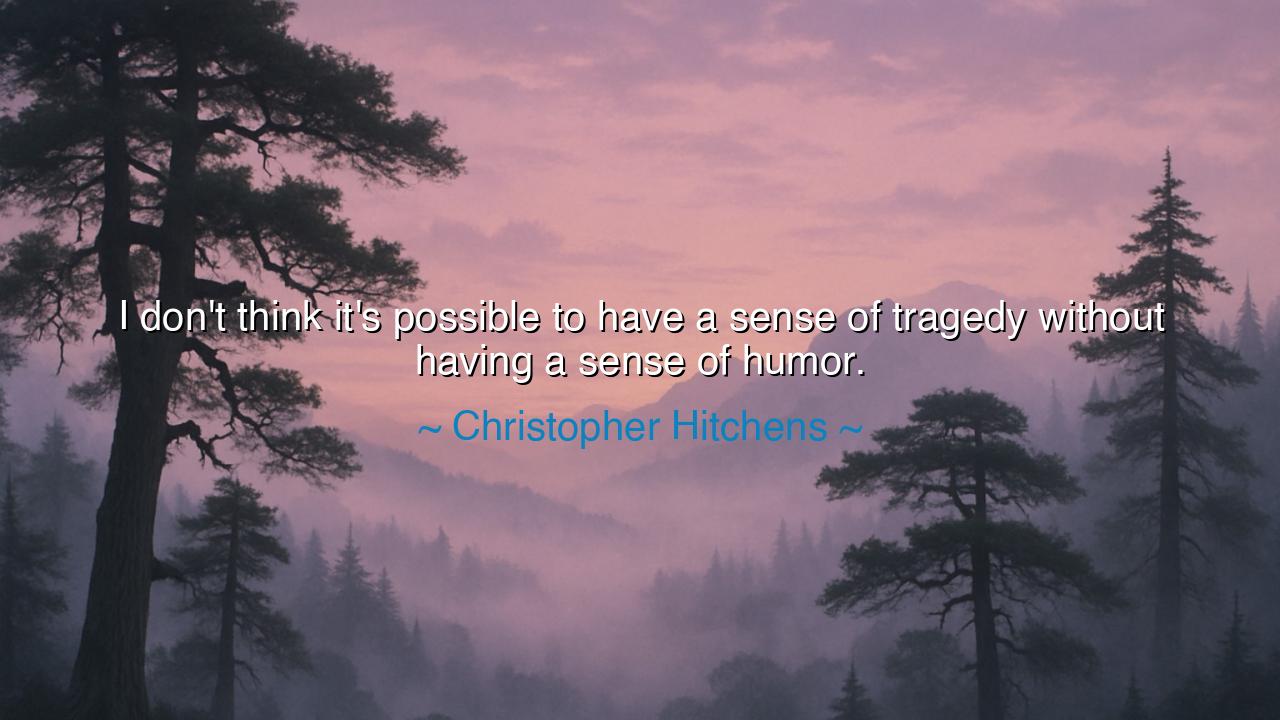
I don't think it's possible to have a sense of tragedy without
I don't think it's possible to have a sense of tragedy without having a sense of humor.






In the long shadow where laughter and sorrow meet, Christopher Hitchens — the fierce thinker and fearless critic — spoke words that ring with the paradox of life itself: “I don’t think it’s possible to have a sense of tragedy without having a sense of humor.” In this statement, we find the wisdom of one who walked through the fires of both intellect and pain, and who knew that humor and tragedy are not enemies but eternal companions. For tragedy reveals the weight of existence, and humor gives us the strength to bear it. One cannot truly understand the one without embracing the other.
Hitchens was a man who lived amid contradictions — an orator who mocked gods yet revered truth, a critic of folly yet a lover of humanity. His wit was a sword, sharp and shining, but beneath it beat a heart that had known suffering and loss. When he spoke of humor and tragedy as bound together, he spoke from the depths of human experience. He knew that laughter, when it springs from pain, is not mockery — it is survival. To laugh at tragedy is not to diminish it; it is to transcend it. It is to stand amid the ruins and still find something that affirms life.
The ancients, too, knew this sacred bond. The Greeks, who birthed both comedy and tragedy, never saw them as opposites but as two halves of the same coin. Aristophanes could make Athens roar with laughter even as Sophocles made them weep, for both sought to reveal the truth of the human condition. The man who cannot laugh at his suffering has not yet understood it; and the man who cannot weep has not yet loved deeply enough. In laughter, tragedy becomes bearable; in tragedy, laughter becomes wise.
There is a story told of Abraham Lincoln, who, in the midst of the American Civil War — a tragedy of brothers turned against brothers — found strength in humor. When his generals faltered and the nation trembled, Lincoln told stories, humble and warm, that softened fear and rekindled hope. His laughter was not careless; it was sacred. It reminded his people that even in their grief, they were still human, still alive, still capable of joy. Thus, in his humor lived his greatness, for he understood what Hitchens later spoke: that to know the full sorrow of life and still smile is the highest form of wisdom.
Humor and tragedy, then, are the twin lights that guide the human spirit through the darkness. Tragedy reveals the limits of our strength; humor reveals that strength renewed. To laugh in pain is to reclaim mastery over fate. It is to say, “You may wound me, but you will not define me.” Those who have walked through sorrow without bitterness know that humor is not denial — it is defiance. It is the courage to smile at the absurdity of existence and still love it fiercely.
In truth, there can be no sense of tragedy without a sense of humor, because both require depth of perception. Only the shallow see life in one color; the wise see its spectrum — light and shadow, joy and despair. Humor opens the heart to contradiction and teaches compassion; tragedy deepens the soul and teaches humility. Together, they create balance. The laughter that follows tears is not frivolity; it is resurrection — proof that the human spirit, though fragile, is unbreakable.
So let this be your lesson, child of the future: do not flee from laughter when sorrow visits you, nor from sorrow when laughter fills your heart. Let both dwell within you, for they are siblings born of truth. When you suffer, find the courage to smile; when you laugh, remember the tears that made it possible. Do not seek a life without tragedy — it cannot exist. Instead, seek the grace to meet it with humor, and in doing so, you will rise above despair. For as Christopher Hitchens taught, those who can laugh in the face of tragedy have already won the deepest victory — the triumph of the soul over fate.






AAdministratorAdministrator
Welcome, honored guests. Please leave a comment, we will respond soon